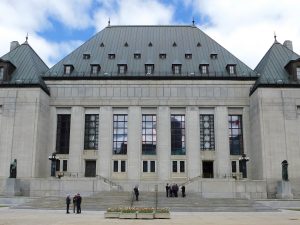
by Adam LaRiviere
On February 24th, 2020, the Alberta Court of Appeal (‘ABCA’) released its decision regarding the constitutional challenge of the Greenhouse Gas Pollution Pricing Act, SC 2018, c 12 (‘Act’). The case was decided 4-1 in favour of the Alberta government and stated that Parts 1 and 2 of the Act were unconstitutional in their entirety. This decision is the third of its kind, with the Ontario and Saskatchewan Courts of Appeal deciding in favour of the federal government 4-1 and 3-2 respectively. The Supreme Court of Canada (SCC) was set to hear appeals from Ontario and Saskatchewan on March 24th and 25th in order to make a final decision on the constitutionality of the Act, however due to Covid-19, the Court has postponed the hearing to June 2020.
What is the Act?
The Act came into force in June 2018, with some aspects, such as the federal fuel charge system, being applied as late as January 1st, 2020. The Act is a direct response to the current climate crisis, and seeks to lower green house gas (GHG) emissions by imposing a minimum set of price standards for both carbon-based fuels and industry-based emissions which provinces must adhere to. This means that all Provinces and Territories are required to meet the minimum price per tonne of carbon dioxide equivalent and establish emission caps as directed by the Act.
Previous Decisions
The reasoning behind the ABCA majority’s decision in this case differed greatly from the previous challenges in Ontario and Saskatchewan. In those appeals, both majorities found that the legislation was validly enacted under the national concern doctrine of Parliament’s Peace, Order and Good Government (POGG) powers; however, it was stated that neither court considered the impact of the Act on the exclusive jurisdiction of the provinces to make laws relating to the development and management of their natural resources under s. 92(A) of the Constitution.
The ABCA’s Decision
The ABCA’s decision was largely founded on the rejection of the application of the national concern doctrine. The majority stated that this doctrine cannot be used to assign a new head of power to the federal government where the subject matter falls within the province’s exclusive jurisdiction. The subject matter of the Act was contested by the parties but the court found that, at its minimum, the Act is aimed at the regulation of GHG emissions. The court focused on the infringement of the provinces’ exclusive power to develop and manage their natural resources granted under s. 92(A). It was found that these powers, in conjunction with the provinces’ proprietary rights in their resources, afford the provinces substantial control over the development of their resources. This includes the ability to regulate resources after they have been extracted. The majority continued, stating that the legislation also falls under the provincial power over property and civil rights (s.92(13)), the power over local works and undertakings (s. 92(10)), and finally the power of direct taxation (s. 92(2)).
The majority also stated that even if they are incorrect in the above finding, the national concern branch of Parliament’s POGG powers cannot apply. They state that the subject matter of the impugned legislation is not sufficiently distinct or indivisible from provincial powers for the national concern doctrine to apply. Rather, the legislation allows the federal government to determine the degree to which the provinces must exercise their power, thus rendering it meaningless. Additionally, the powers granted to Parliament are not inherently limited in the legislation. This creates the potential for Parliament to regulate all things pertaining to the environment or climate change.
Justice Feehan wrote in dissent that he would uphold the Act. He dismissed the idea that the Act infringes the exclusive jurisdiction of the provinces on the grounds that S. 92(A) cannot limit pre-existing federal powers including the national concern branch of the POGG powers. He then stated that the subject matter of the legislation is much more narrow and concerns the need to make a behavioral change in Canada towards more efficient energy use through the use of pricing standards for GHG emissions. Consequently, he stated that this characterization of the Act is within the scope of the national concern doctrine.
Future Litigation
As mentioned, the SCC was meant to hear the appeals from Ontario and Saskatchewan, in addition to the Alberta appeal, on March 24th and 25th. While the decisions have been 2-1 in favour of the federal government, the Justices have been split 7-5 on this issue overall. Parliament remains confident in their position despite this lack of consensus and they feel confident that the “price of pollution is within federal jurisdiction.”
Adam LaRiviere is a 1L JD student at the Faculty of Law and is a member of the Asper Centre Climate Justice student working group this year.
